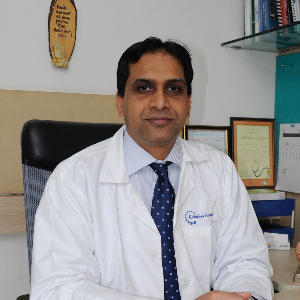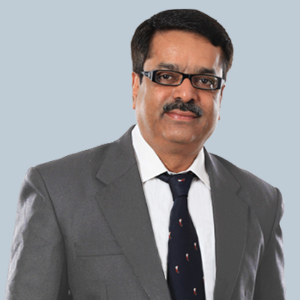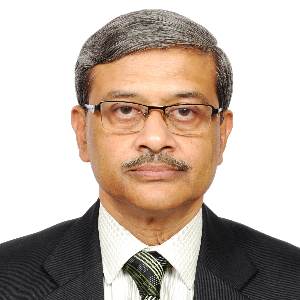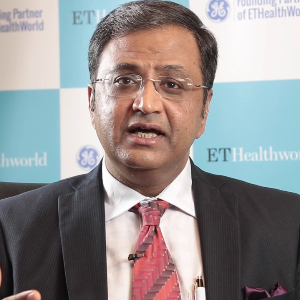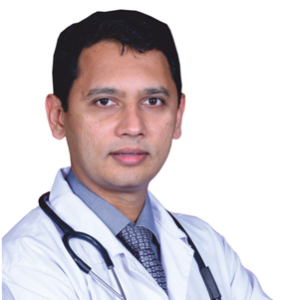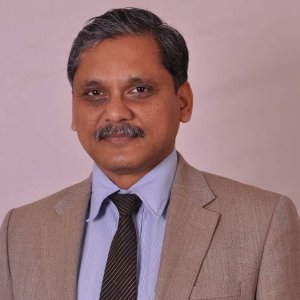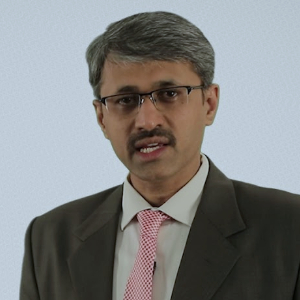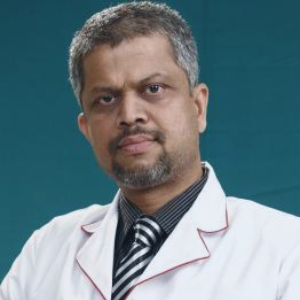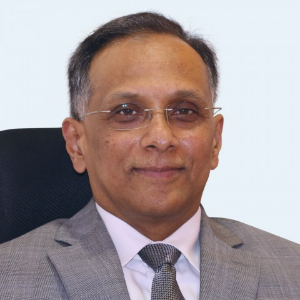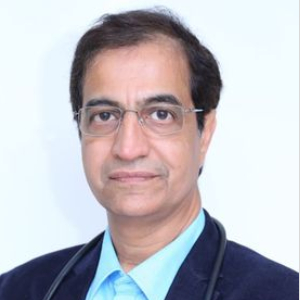Best Doctors in India for Vagus Nerve Stimulation
- Neuro Surgeon & Spine Surgeon, Mumbai, India
- Over 26 years’ experience
Profile Highlights:
- Dr. Abhaya Kumar is a leading name in the field of Neurosurgery who is an expert in Minimally Invasive Spine Surgery, Brain surgery, and Stereotactic Radiosurgery and has performed more than 1400 spine surgeries and 1100 brain surgeries in KDAH alone.
- Dr. Abhaya Kumar’s primary focus includes Minimally Invasive Spine Surgery (MISS) and has handled over 800 MISS cases till date in the hospital with 96% successful results.
- Neurosurgeon, Mumbai, India
- Over 25 years’ experience
Profile Highlights:
- Dr. Ashok Hande is a renowned neurosurgeon in Mumbai who holds the credit for 300 AVMs, 1400 skull base tumor surgeries, 3600 surgeries for cranial and spinal trauma, 1200 lumbar prolapsed intervertebral disc surgeries, 800 cerebral aneurysms, and more than 100 microvascular decompressions.
- He holds an experience encompassing 25+ years and holds the credit for pioneering neurosurgery in Mumbai by bringing in new and advanced neurosurgical procedures for brain and spine surgery.
- Neurosurgeon, Mumbai, India
- Over 28 years’ experience
Profile Highlights:
- Dr. Deepu Banerji is a leading name in the field of Neurosurgery in India and possesses extensive skills in minimally invasive and micro neurosurgery.
- He has been practicing neurosurgery for over 28 years and is counted among the best microscopic neurosurgeons in the country.
- Apart from minimally invasive surgeries, his expertise lies in skull base surgery, brain tumors surgery, vascular surgery, and spine surgeries, and has handled numerous cases of brain and spine diseases and disorders.
- Neurosurgeon, Chennai, India
- Over 35 years’ experience
Profile Highlights:
- Dr. K Sridhar is a renowned Neurosurgeon who has an experience of 35+ years in brain and spine surgery and has performed over 1000 complex brain tumor surgeries.
- His primary area of interest is skull base surgery, micro neurosurgery, and spine surgery, and is currently working on lesions of the brain stem.
- Neurosurgeon, Bengaluru, India
- Over 22 years’ experience
Profile Highlights:
- Dr. Madhusudan H V is an expert Neurosurgeon in South India with 22+ years of experience in neuro and spine surgery.
- With a specialization in minimally invasive neurosurgeries, Dr. Madhusudan holds the credit for more than 7000 neurosurgeries. He also finds interest in endoscopic interventions and frameless navigations.
- Neurosurgeon & Spine Surgeon, Bengaluru, India
- Over 20 years’ experience
Profile Highlights:
- Dr. Prahraj S S is a leading Neurosurgeon who specializes in all types of neurological surgeries and has performed over 6000 neurosurgeries till date along with complex cranial and spine surgeries.
- He is one of the most renowned neurosurgeons in the country and has provided his services to some of the premier medical institutes in India such as NIMHANS where he performed a large number of spinal surgeries.
- Neurosurgeon & Spine Surgeon, Bengaluru, India
- Over 15 years’ experience
Profile Highlights:
- Dr. Praveen K S is a highly qualified neurosurgeon with over a decade of experience in handling all kinds of neurological diseases and disorders.
- He specializes in Pediatric Neurosurgery, Neuro-Oncology, Endoscopic neurosurgery, Aneurysms, and Neuro- Trauma and has performed over 4000 neurosurgeries in his career.
- Neurosurgeon & Spine Surgeon, Mumbai, India
- Over 20 years’ experience
Profile Highlights:
- Dr. Rahul Modgi is a highly established neuro and spine surgeon in Mumbai specializing in all types of brain and spine surgeries.
- Dr. Rahul Modgi’s name has been recorded in the Limca Book of Records in 2014 when he removed the heaviest iron rod from the brain of a 17-year-old patient. He has also performed various other risky surgeries for which he has greatly appreciated.
- Neurosurgeon, Bengaluru, India
- Over 30 years’ experience
Profile Highlights:
- Dr. Rajakumar V Deshpande is a renowned Neurosurgeon in Bengaluru. He performed the first pedicle screw fixation surgery for a spine injury in Bangalore.
- Dr. D V Rajakumar specializes in endoscopic neurosurgeries and has performed some of the most complex brain and spine surgeries through the endoscopic approach. His other areas of interest include minimally invasive neuro surgeries, management of cerebrovascular diseases, and brain tumor surgeries.
- Stroke Specialist & Neurologist, Mumbai, India
- Over 30 years’ experience
Profile Highlights:
- Dr. Shirish M Hastak is one of the best Stroke Specialists in India with a specialization in Neurology.
- Dr. Hastak underwent training in stroke management under world-renowned neuroscientist, Dr. Vladimir Hachinski at the Western University of Canada.
- He holds more than 30 years of experience as a neurologist among which he has spent 2 decades mastering stroke management.
Best Hospitals in India for Vagus Nerve Stimulation
Fortis Escorts Hospital, New Delhi
- City: New Delhi, India
Hospital Highlights:
- Over the last 33 years, the Fortis Escorts Heart Institute has set new standards in cardiac treatment with groundbreaking research. It is now known around the world as a centre of expertise for Cardiac Bypass Surgery, Interventional Cardiology, Non-invasive Cardiology, Paediatric Cardiology, and Paediatric Cardiac Surgery.
- The hospital has cutting-edge laboratories that perform a wide range of diagnostic tests in Nuclear Medicine, Radiology, Biochemistry, Haematology, Transfusion Medicine, and Microbiology.
- Fortis Escorts Heart Institute boasts a diverse group of bright and experienced doctors who are backed up by a team of highly qualified, experienced, and devoted support professionals as well as cutting-edge equipment such as the recently installed Dual CT Scan.
- Approximately 200 cardiac doctors and 1600 personnel currently collaborate to manage over 14,500 admissions and 7,200 emergency situations each year. The hospital now has a 310-bed infrastructure, as well as five cath labs and a slew of other world-class amenities.
Rela Hospital, Chennai
- City: Chennai, India
Hospital Highlights:
- RIMC is a multi-specialty hospital in a sprawling area of 36 acres located in Chromepet, Chennai, Tamil Nadu, India.
- The facility has 450 beds including 130 critical care beds, 9 operating rooms, modern reference laboratories and radiology services, and is conveniently located near road, rail and air transportation.
- RIMC is led and managed by world-renowned physicians committed to healthcare.
- RIMC offers the broadest range of clinical care, education, and research. The hospital offers state-of-the-art technology and modern treatment facilities designed to provide health care at an affordable cost.
- Rela Institute is driven by patient needs, comfort and confidence.
CARE Hospitals, Hyderabad
- City: Hyderabad, India
Hospital Highlights:
- CARE Hospitals were established in the year 2000, by CARE Group.
- The multispecialty hospital has 435 beds, including 120 critical care beds, with an annual inflow of 180000 outpatients and 16,000 in-patients.
- The hospital provides specialty medical services in Cardiology, Cardiothoracic Surgery, Pediatric Cardiology, Pediatric Cardiothoracic Surgery, Neurology, Neurosurgery, Nephrology, and Urology.
- The hospital has the first dual source, 128 slice CT scanner (for high precision cardiac imaging) – the first of its kind in south India.
- The hospital offers a wide range of accommodation facilities for the convenience of its varied patient base, ranging from general wards to super deluxe rooms.
Fortis Hiranandani Hospital, Mumbai
- City: Mumbai, India
Hospital Highlights:
- Fortis Hiranandani hospital was established in 2007.
- The hospital is an advanced tertiary care, multi-specialty hospital equipped with 149 beds.
- The hospital is equipped with a super ICU to provide emergency medical care to critically ill patients.
- The hospital is NABH accredited.
- The critical care facility in the hospital is augmented with the state-of-the-art facilities that facilitate speedier diagnosis and efficient monitoring.
- The hospital provides specialty medical services in cardiology, orthopedic science, pediatric science, neurology, diabetic care, urology, nephrology, ENT, obstetrics, gynecology, cosmetic surgery, bariatric surgery, neuro and spine care.
Fortis Hospital, Anandpur, Kolkata
- City: Kolkata, India
Hospital Highlights:
- Fortis Hospital, Anandapur, Kolkata is a world-class super-speciality equipped with the latest technologies in the medical world.
- The hospital is NABH accredited.
- This state-of-the-art facility specializes in cardiology and cardiac surgery, urology, nephrology, neurosciences, orthopaedics, digestive care, emergency care and critical care.
- The hospital, governed by integrated Building Management System (IBMS), has a pneumatic chute system, for quick vertical and horizontal transportation between floors, facilitating speedy transfer of patient specimens, documents, reports, and medicines to the concerned departments.
- The hospital also has a nephrology department with over 28 advanced dialysis units.
Fortis Hospital Banerghatta, Bengaluru
- City: Bengaluru, India
Hospital Highlights:
- Fortis Hospital Bannerghatta, Bengaluru was established in 2006.
- The hospital is a 276 bedded multi-specialty tertiary care facility.
- The hospital specializes in cutting-edge medical technology and dedicated patient care services.
- The hospital is equipped with state-of-the-art technologies like trans-radial angioplasty, trans-abdominal cardiac surgery, and computerized TKR navigation surgery.
- The hospital provides specialty medical services in cardiology, cardiac surgery, orthopedics, neurology, neuro-surgery, GI, and Minimal Access Surgery (MAS).
Fortis Hospital, Malar, Chennai
- City: Chennai, India
Hospital Highlights:
- Fortis Malar was established in 1992 and was formerly known as Malar Hospital.
- The hospital specializes in cutting-edge medical technology and dedicated patient care services.
- The hospital is multi-specialty, tertiary care facility with 180 beds.
- The hospital offers comprehensive medical care in specialties such as cardiology, cardio-thoracic surgery, neurology, neurosurgery, orthopedics, nephrology, gynecology, gastroenterology, urology, pediatrics, and diabetes.
Gleneagles Global Hospital, Parel, Mumbai
- City: Mumbai, India
Hospital Highlights:
- Gleneagles Global Hospital The 450-bed facility comprises of 17-stories, housing state-of-the-art infrastructure, and advanced medical care facilities.
- The hospital offers end-to-end clinical, surgical, and diagnostic services. It is equipped with a team of eminent medical professionals aided by qualified nurses and medical staff
- The Hospital offers advanced Endoscopic procedures, Hepatobiliary and Liver Surgeries, Surgical and Medical Gastroenterology, Bariatric Surgery, and Robotic surgery.
- The hospital is a center of excellence for Orthopedics, Joint Replacement, Knee Replacement, and Hip Replacement surgery.
Jaypee Hospital, Noida
- City: Noida, India
Hospital Highlights:
- Jaypee Hospital is the flagship hospital of the Jaypee Group.
- This hospital has commissioned 525 beds in the first phase and has been planned and designed as a 1200 bedded multi-specialty facility.
- It holds the accreditation of the NABH and NABL.
- The hospital has state-of-the-art infrastructure equipped with the latest technologies and modern equipment like 64 Slice PET CT, Dual Head 6 Slice SPECT CT, Gamma Camera, and Da Vinci Robotic Surgery for comprehensive robotic surgical solutions.
- It has special Centers dedicated to the major specialties to provide hassle-free and high-quality clinical care.
Manipal Hospital, Dwarka, Delhi
- City: New Delhi, India
Hospital Highlights:
- Manipal Hospitals, Dwarka, is a super-specialty hospital in Dwarka, New Delhi, which is a part of Manipal Hospitals Group.
- The hospital aims to provide the best treatment on par with international standards at a fraction of the cost.
- Equipped with 380 beds, the hospital is also one of the new age hospitals which are equipped fully with state-of-the-art infrastructure, cutting-edge technology as well as the latest and advanced clinical practices. The hospital also has 13 modular Operation theatres with 118 beds which are solely meant for critical care.
- The hospital comprises internationally acclaimed doctors and highly professional and experienced hospital and medical staff who are able to provide preventive, therapeutic, and diagnostic services all under one roof.
Vagus Nerve Stimulation
Vagus nerve stimulation is a type of treatment which is used for epilepsy and depression. It involves the use of a device that can stimulate the vagus nerve with the help of electrical impulses. A human body has two vagus nerves on each side. They run from the brainstem through the neck to the chest and abdomen.
The procedure is a type of neuromodulation. It has been designed for changing how the cells of your brain work with the help of electrical stimulation to certain areas involved in seizures. It can help several organs which include your voice box, heart, lungs as well as the digestive tract.
Purpose
Approximately one-third of people who suffer from epilepsy usually don’t respond well to anti-seizure drugs. Vagus nerve stimulation can be an option for reducing the frequency of seizures in people who are unable to achieve control with medications.
Vagus nerve stimulation may also be beneficial for people who are not responding well to intensive depression treatments, including antidepressant medications, psychotherapy or electroconvulsive therapy.
Before the procedure
Your doctor will need to do a physical examination before the surgery. You may require few blood tests or other tests in order to make sure that you are not going through any health concerns that might later cause a problem. Your doctor might let you take antibiotics before surgery to prevent any infection.
During the procedure
Surgery for implanting the vagus nerve stimulation device is generally done on an outpatient basis, although some surgeons may recommend you to stay overnight.
The surgery should take an hour to 90 minutes. Your doctor might numb the surgery area using local anesthesia or might use general anesthesia so that you are unconscious during the entire procedure.
Two incisions are made; first one is on your chest or in the armpit (axillary) region and the second one is on the left side of your neck.
Then your surgeon implants the pulse generator in the upper left side of your chest. This device is meant to be a permanent implant, but you can remove it, if required.
The pulse generator is generally the size of stopwatch and it runs on battery power. A lead wire will be next connected to the pulse generator. Then the surgeon will guide it under your skin from your chest up to your neck. There your surgeon attaches it to the left vagus nerve through the second incision.
After the procedure
A few weeks after the surgery, the pulse generator can be turned on during your next visit to your doctor’s office. It can be programmed to deliver electrical impulses to the vagus nerve at various durations, currents and frequencies. Usually, vagus nerve stimulation starts at a low level and is later increased gradually depending on your symptoms and side effects.
The stimulation is programmed to turn on and off in specific cycles. You can experience some tingling sensations or even a little pain in your neck as well as temporary hoarseness when the nerve stimulation is on.
The stimulator is unable to detect seizure activity or symptoms of depression. Therefore, when it’s turned on, the stimulator will be turning on and off at the intervals selected by your doctor. You can use a hand-held magnet for initiating stimulation as well, if you sense an impending seizure.
The magnet can also be used to temporarily turn off the vagus nerve stimulation, which may be necessary when you do certain activities such as public speaking, singing or exercising or when you’re eating if you have any swallowing problems.
It is recommended that you visit your doctor periodically so that you can make sure that the pulse generator is working properly and to check if has shifted out of position. Check with your doctor before having any medical tests, such as magnetic resonance imagine (MRI), which might interfere with your device.
It is to be noted that vagus nerve stimulation can’t cure epilepsy and most patients having epilepsy will not stop having seizures and can’t stop taking epilepsy medication altogether after this procedure. However, many will be having fewer seizures. The intensity of the seizures can also lessen.
It might take months or even a year or longer of stimulation before you are able to notice any significant reduction in seizures.
Risks
Surgery risks
Surgical complications with implanted vagus nerve stimulation are similar to the risks of having any other type of surgery. However, such complications are rare. They can include:
- Pain at the incision site
- Difficulty swallowing
- Infection
- Vocal cord paralysis; this is usually temporary, but can be permanent
Side effects after surgery
There are multiple side effects and health problems which are associated with implanted vagus nerve stimulation. These can include:
- Voice changes
- Throat pain
- Hoarseness
- Shortness of breath
- Difficulty swallowing
- Cough
- Headaches
- Insomnia
- Tingling or prickling of the skin
- Worsening of sleep apnea
Side effects are tolerable. They can sometimes lessen over time. However, some of these side effects can remain and cause some discomfort as long as you use implanted vagus nerve stimulation.
Adjusting the electrical impulses can sometimes help one to minimize these effects. If the side effects are intolerable, then it is best that the device is shut off temporarily or permanently.

